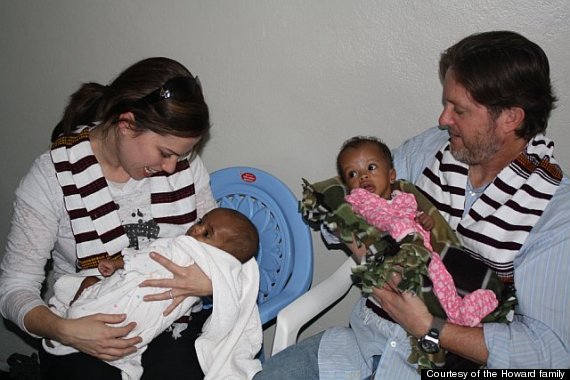On a June evening in 2010, a social worker arrived at the
door of an orphanage in southern Ethiopia, carrying two frail infants. Hours
before, the man had made his way to a rural village, summoned by the children's
grandmother. The boys, Abenet and Afework, had been born several weeks
premature. Their mother had died in childbirth. Their father, a poor farmer
already struggling to keep two older children alive, lacked the resources to
care for them.
The boys' health had worsened drastically since their birth.
They were malnourished and barely responsive to stimulation. After many tears,
the boys' grandmother convinced her son to give them up to an orphanage.
"They will die here," she told him, "It is what God would have
you do." Agonizing over the decision, their father realized that his
mother was right and relinquished custody. "Take them to someone who will
care well for them," he told her.
When the social worker arrived at the orphanage, he was met
by the institution's director and women who would serve as the boys'
caregivers. They were shocked to see that the boys were small enough to fit in
the palm of their hand and that their umbilical cords were still attached.
Racing against time, they rushed the boys to the nearest hospital. All the way
they blew on the babies' faces to keep them alert for fear that if they fell
asleep they would never awake.
Weeks later and thousands of miles away, my wife, Meredith,
and I waited with our three children to hear news from our adoption agency. In
February, we had completed paperwork intending to adopt a little girl from
Ethiopia. Then, in September, our plans changed. We received word of
four-month-old twin baby boys who desperately needed a family. One of the boys
had recently survived a bout with meningitis. The other was severely
malnourished and had contracted sepsis.
Drawn to the children, my wife and I contacted the adoption
agency for more information. We learned that two families had already declined
their referral and that no other couples had inquired about the boys. "I
feel like these are our sons," Meredith told me.
We had the boys' medical files forwarded to Dr. Aronson, one
of the world's foremost pediatricians specializing in international adoptions.
She confirmed that the boys could definitely have special needs, possibly even
need life-long care, but that there was no way to know for sure. After counting
all the costs, and acquiring a generous grant from Gift of Adoption, we told
our agency that we wanted to become the twins' parents. Within a month we were
on a plane to Ethiopia.
In November, we visited the orphanage and met the twins.
Although tiny, they were alert, responsive, and their health had improved. In
December, I stayed home with our two older sons while Meredith returned with
our daughter and my father to bring Afework and Abenet (whom we named Samuel
and Asher) home. By January 1, 2011, we were all together as a family.
Over the next several months, Samuel and Asher saw numerous
doctors and began physical therapy. To our delight and the expert's surprise,
they thrived beyond everyone's expectations. By the summer they had made their
way onto US growth charts and showed no signs of any serious health issues.
Then, in July, we received word that a movie was being
filmed in Atlanta and that the casting department was looking for Ethiopian
babies as extras. On a whim, Meredith sent in the twins' picture. To our
surprise, the casting director called us personally and asked to meet. After
seeing the twins, he said, "I think I've found my hero babies (main
babies) for this storyline."
The next day, we met the director, Kirk Jones, who was
enthralled by the twins' story. A few hours later, we received a call telling
us that Samuel and Asher had been chosen for the movie, and could we meet the
next day with Jennifer Lopez?"
When we entered the room, Kirk called Ms. Lopez and the
actor who would portray the boys' father, Rodrigo Santoro, over to meet us.
"This is Kindred and Meredith Howard," he said. "These guys are
Alex and Holly (their characters in the movie). They've done what you are going
to do in the film."
Kirk's tone and demeanor suggested that he was trying to
honor us for having adopted Samuel and Asher. In truth, we felt that we were
the ones blessed to have Samuel and Asher as sons. All we did was give two
incredible little boys a home. The ones who truly deserved honor were the
mother who had given her own life for them and the father who, out of love,
made the difficult decision to give them up for adoption.
We spent eight of the next fourteen days on the set of What
to Expect When You're Expecting, a movie based on Heidi Murkoff's best-selling
book. Watching Sammy and Asher take turns cuddling with Jennifer Lopez on
camera and playing peek-a-boo with her in between takes, all Meredith and I
could do was marvel. Fourteen months earlier, our sons had lain dying in a
rural Ethiopian village. Now they were playing pat-a-cake with J-Lo and winning
the hearts of the cast and crew of a major motion picture.
This week, Samuel and Asher will make their movie debut as
Lopez's adopted son, Kaleb. But Samuel and Asher are much more than little
movie stars. They are truly "hero babies," not because of a movie
role, but because of their journey. They are living testimonies to the heroism
of their Ethiopian parents and caregivers. They are real examples of the
amazing and unforeseen blessings that await those who choose to adopt. Samuel
and Asher are inspirational because of what their survival and journey has, and
will, teach others as they continue to grow, thrive, and impact lives.
http://www.huffingtonpost.com


No comments:
Post a Comment